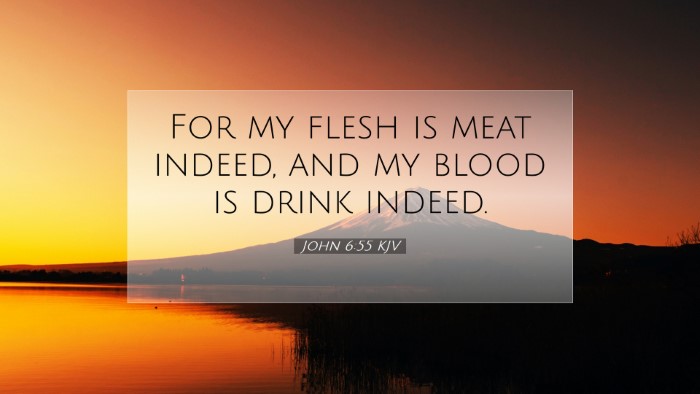Commentary on John 6:55
Verse: "For my flesh is true food, and my blood is true drink." (John 6:55)
Introduction
The Gospel of John presents profound theological insights that are foundational to Christian doctrine. In John 6:55, Jesus articulates the vital relationship between Himself and the believers' spiritual sustenance. This verse is integral to understanding the concept of communion and the Eucharist in Christian liturgy, emphasizing the necessity of Christ's body and blood for spiritual nourishment.
Theological Significance
John 6:55 stands out in the broader narrative of John's Gospel, particularly in the context of Jesus’ teaching on the Bread of Life. The significance of "flesh" and "blood" transcends mere physicality, embodying the sacrificial nature of Christ's ministry.
- Christ’s Incarnation: According to Matthew Henry, the mention of "flesh" reflects the importance of Christ’s humanity and His tangible, incarnate presence among us.
- Spiritual Nourishment: Albert Barnes emphasizes that this verse underlines the necessity for believers to partake of Christ's life, suggesting that His flesh and blood provide sustenance for the soul.
- Symbol of Sacrifice: Adam Clarke notes that Jesus foreshadows His sacrificial death, where His body and blood would be offered for redemption, thereby instituting a new covenant.
Exegesis of Key Terms
In understanding this scripture, it is vital to explore the key terms:
- Flesh (sarx): In biblical language, "flesh" often denotes not merely the physical body but can also symbolize human frailty and mortality. According to Henry, it conveys the idea of Christ's genuine human experience.
- Blood (haima): Blood in biblical context is a powerful symbol of life and sacrifice. Barnes points out that Jesus' reference to His blood conveys the ultimate sacrifice necessary for redemption.
Contextual Analysis
To grasp the intensity of Jesus' proclamation, it is prudent to consider the context surrounding John 6:55:
- Bread of Life Discourse: John 6 features Jesus' declaration that He is the Bread of Life, connecting physical hunger to spiritual hunger. The preceding verses lay the groundwork for recognizing Christ as essential for eternal life.
- The Jewish Response: The reaction from the Jewish audience was one of confusion and offense, illustrating the barrier that often exists in perceiving spiritual truths. Clarke remarks on the incredulity of the listeners, highlighting their struggle to grasp the metaphoric language Jesus employs.
Spiritual Implications for Believers
For contemporary readers, John 6:55 offers rich implications for faith and practice:
- Communion and Fellowship: Henry emphasizes the practice of communion as a means of remembrance and spiritual nourishment, where believers partake in the body and blood of Christ symbolically.
- Dependence on Christ: Barnes notes that the verse reinforces the believer's dependence on Christ for spiritual survival, akin to how one depends on food and drink.
- Participation in His Life: As Clarke indicates, participating in Christ's body and blood represents deeper spiritual truths about incorporation into the life of Christ, fostering unity between believers and their Savior.
Conclusion
John 6:55 encapsulates the essence of Jesus’ teachings about His identity and mission. This verse not only serves as a profound theological statement about the nature of Christ’s sacrifice but also as a call for believers to engage in an intimate relationship with Him. The insights provided by public domain commentaries reveal the depth of this verse, offering pastors, students, and theologians substantial material for reflection, teaching, and application in their spiritual journeys.


